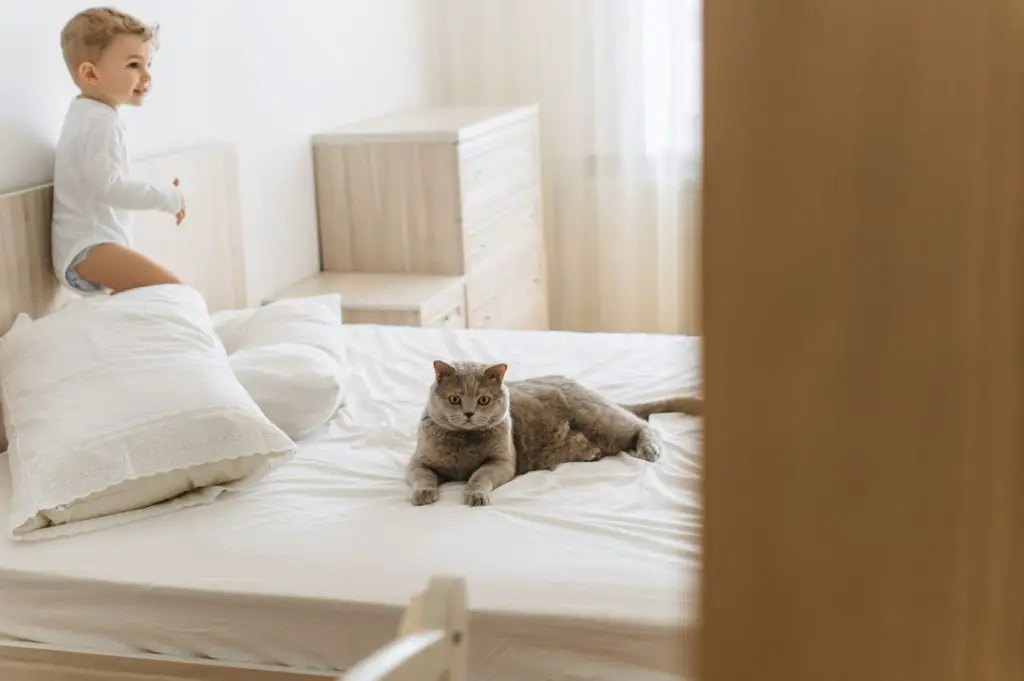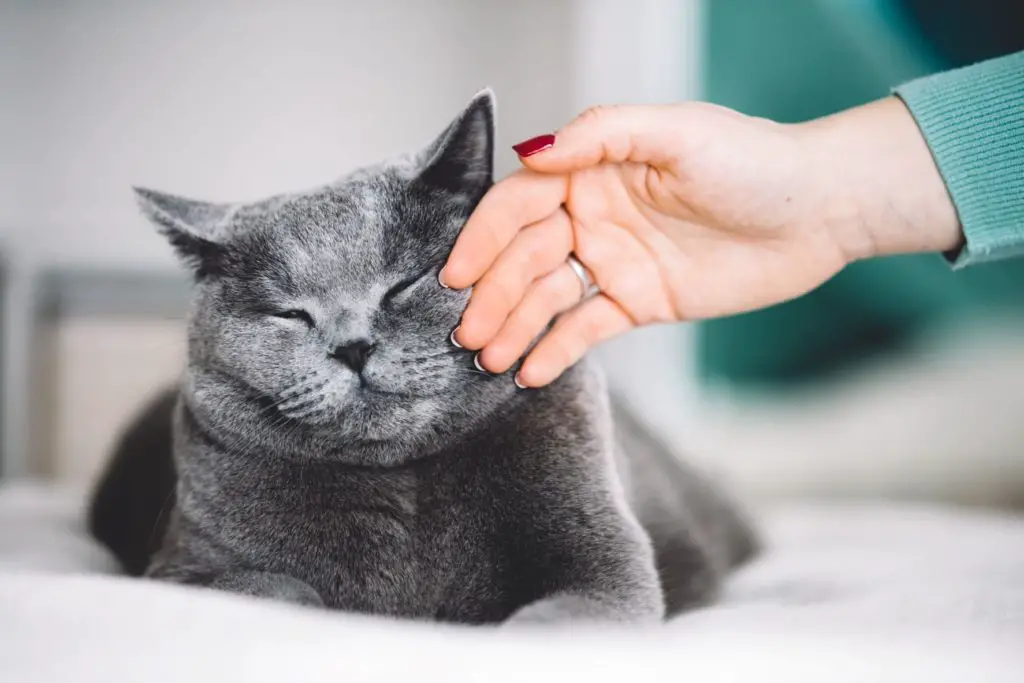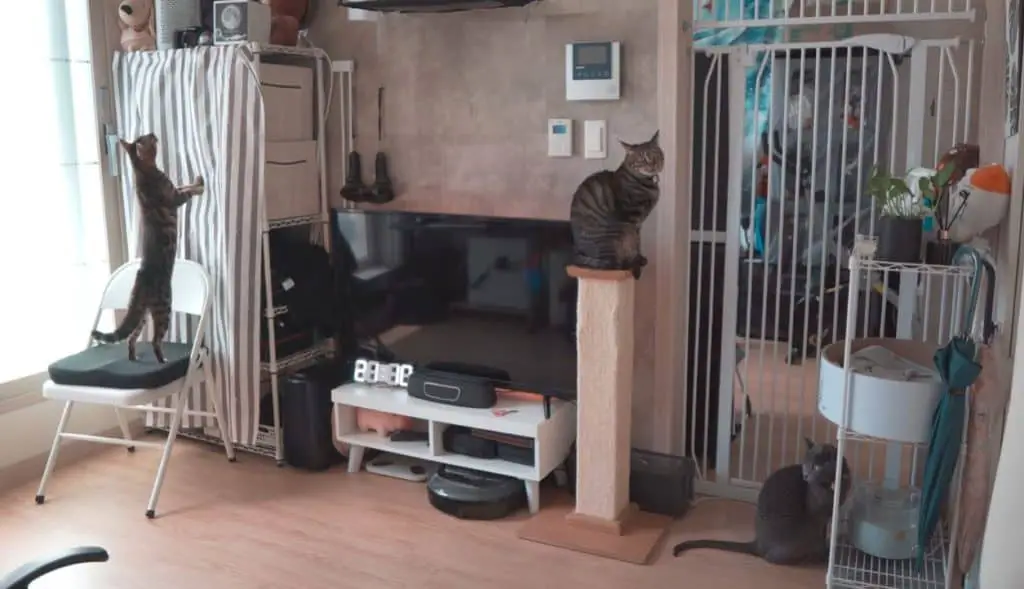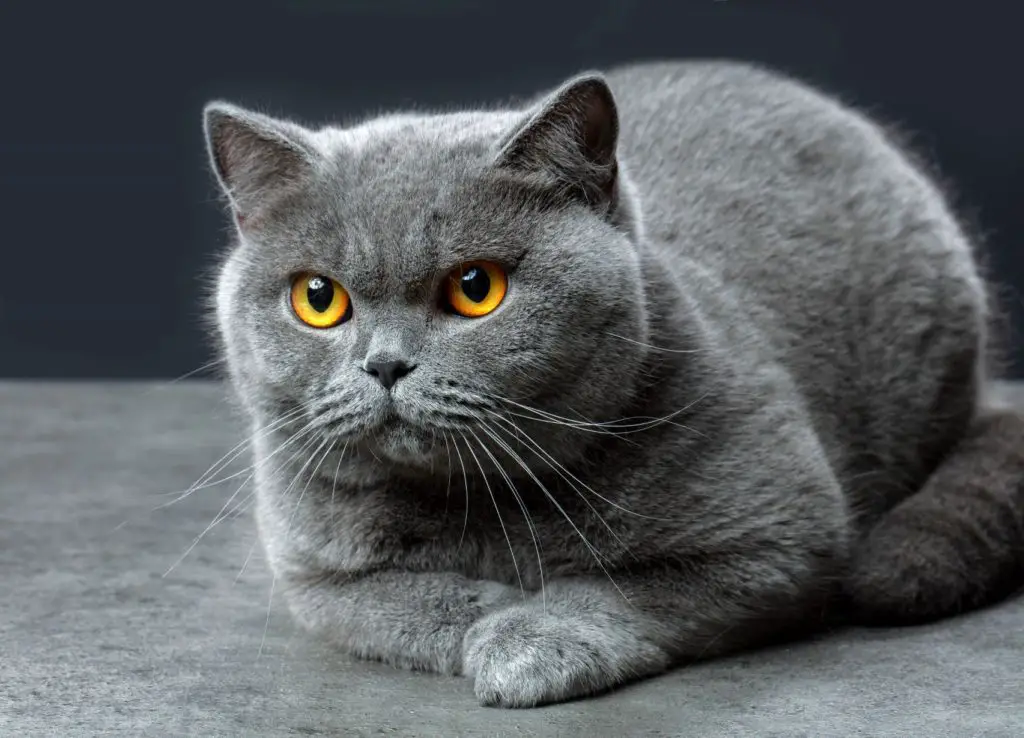Are British Shorthair Cats Good Apartment Cats? Yes, British shorthair cats are among the best cat breeds for apartment dwellings. This is due to their easygoing nature and laid-back personality. They are not overly energetic or demanding and will happily be on the couch or the window sill all day. Their need to vocalize is also minimal, so your neighbors won’t be hearing them!

British shorthair cats are one of the most popular family feline pets in the United Kingdom. Not only are they extremely easygoing, but they are also low maintenance. In addition, they have an endearing and unique quality not seen in other breeds: a winning smile that comes from their round and prominent whiskers.
According to the GCCF (Governing Council of the Cat Fancy), nearly a quarter of all kittens registered are British Shorthairs! Are you looking to add the British Shorthair to your family? Perhaps you’re worried that it may not be suitable for an apartment dwelling.

Let me tell you why the British Shorthair cat breed makes one of the best apartment cats.
In this guide, I’ll cover:
- Are British Shorthair cats good apartment cats and why?
- Can the British shorthair cat be an indoor cat?
- Can you leave the British shorthair cat alone at home?
5 Reasons Why British Shorthair Cats Are Good Apartment Cats
The following aspects of British Shorthair cats’ personalities make them great for apartment dwellers:
They Are Easy-Going, Laid Back Cats
Ask any British Shorthair cat owner about their cat’s personality, and the chances are that a majority of them will describe their pet as ‘easygoing’ and laid back.

A British Shorthair cat will be happy to curl up at your feet, on the couch, or the top of your dresser all day. They don’t need too much attention and are fairly independent. As long as they are well-fed and exercised, they won’t destroy your furniture or scratch walls. If you live in a rented apartment, you won’t have to worry about your landlord complaining about pet damage.
This easygoing nature makes British shorthairs one of the best cat breeds for apartment dwellers.
Also, check out another Breed guide: Are Persian Cats Good For Apartments?
They Are Not Very Vocal Cats
When you live in an apartment, the chances are that you have neighbors close by, and the last thing you want is them complaining about your cat’s loud meowing.
With a British shorthair cat, this won’t be an issue. Of course, you must always make sure to meet all your cat’s food, exercise, and other basic needs. As long as those are covered, your neighbors won’t even know you own a cat!
They Are Highly Tolerant and Adapts Quickly
Another wonderful aspect of the British Shorthair’s personality is its superior adaptability. In an apartment, there are things always changing and of course, a lot more traffic due to the smaller space compared to a house. Therefore, having a cat that’s flexible and quick to adapt is an important trait.

Moreover, British Shorthair cats are quite a docile breed. Very tolerant of different types of experiences when it comes to physical interaction such as being picked up, pet or even belly rubbed (even though most cats dislike belly rubs).
British Shorthair Cats Are Low Maintenance
Compared to other high-maintenance breeds, the intelligent British Shorthair does not get bored easily. Thus, they don’t require as much attention as other breeds, such as the Siamese or the Bengal cat. It is suitable as an indoor cat and can thrive even in a small space without a huge yard. British shorthair cats are curious and playful and will gladly spend hours playing with the same indoor cat toys.

Naturally, you must provide them with exercise and mental stimulation. Otherwise, they are prone to weight gain and depression. But, with a proper diet and regular moderate activity, you can keep their weight in check and prevent feline depression.
Read: Here are some of the best ways to manage your cat’s weight (without much effort).
British Shorthair Cats are Independent
A British shorthair cat can easily entertain itself, and it is also curious and intelligent to quickly find that catnip or toys you have hidden around the apartment. This independent, easygoing, non-demanding, and non-attention-seeking personality makes the British Shorthair great for first-time cat owners living in small apartments.

Although they are quite independent, they do like to be in the same room or area as their humans. It will gladly follow that individual anywhere they go. They are highly affectionate and loving in their own way. This loving and adaptable nature makes them an excellent addition to any household.
Also read: Are Scottish Folds Good Apartment Cats?
Can The British Shorthair Cat Be an Indoor or Apartment Exclusive Cat?
Yes. British shorthairs will generally be happy to stay indoors. They won’t meow your heads off or scratch at doors and windows to be let outside. Instead, they will gladly look outside the window all day.
While the British Shorthair’s history shows that Romans primarily bred to keep away mice and snakes off campsites, today, it is mainly a house cat or companion pet, which is why it favors the indoors.
Of course, all cat owners, on their part, should spay and neuter their cats at the right time. This way, you won’t have to worry about your cat trying to search for a mate outdoors. You must also make the indoors fun by providing plenty of opportunities for your pet to express its instincts.

Here are some practical tips for taking care of your British Shorthair cat in an apartment:
Leverage Their Love of Food
One of the best ways to keep a cat mentally sharp and manage its waistline is to use a large foraging board or a food activity board. It not only lets cat parents keep an eye on their cat’s eating habits but also allows a more meaningful mealtime instead of putting their face into food and devouring it.
Keep Them Off of The Ground
British shorthair cats love to observe the world from a perch or a vantage point as most cats do. Make sure to catify your apartment with cat furniture. Additionally, catification provides your cat with some new ways of navigating the apartment and it keeps your cats off of the floors to prevent accidents from happening (like stepping on some tails).
British Shorthair Cats Are Heavy: Get Durable & Stable Cat Furniture
The British Shorthair cat was bred to be a dense, muscular cat, with an adult male ranging from 4.1-7.7 kg and females 3.2-5.4 kg. This means is that shoddy quality cat furniture or items for your British Shorthair cat will likely not hold up to the brunt of this chonkster of a breed.

Therefore, making sure their scratching post, cat tower, and other cat furniture in their apartment are sturdy and stable is important to 1. saving your money and 2. keeping your feline safe. Additionally, it will prevent any accidents from happening in your apartment (especially important if you don’t want to keep spending money on repairs and replacements).
Here’s my curated list of the best cat furniture for apartments.
Can You Leave the British Shorthair Cat Alone at Home?
Yes, it is quite safe to leave your British Shorthair cat alone – but only for a few hours. Ensure you have fed it and keep a supply of fresh drinking water for it.
Never leave your cat home alone for long periods of time, especially overnight or for more than an entire day, and this is not safe for your cat.
British shorthair cats need their humans around them, and they thrive on love and attention. While a few hours each day is okay, do not leave your British Shorthair alone for more than 8-9 hours at a stretch. If needed, hire a pet sitter or request a neighbor to come and feed your cat.
Conclusion: Are British Shorthair Cats Good Apartment Cats?
British Shorthair cats are generally excellent apartment cats because they are not too vocal or loud, and they are also very independent and easygoing. The highly adaptable cat breed also does not need too much exercise and, as long as its basic needs are met, will gladly spend all day on the couch, a perch, or a window sill.
For some real statistics on what kind of cat breeds people actually have in their homes, read: Best Indoor Cat Breeds (With Actual Statistics!)
